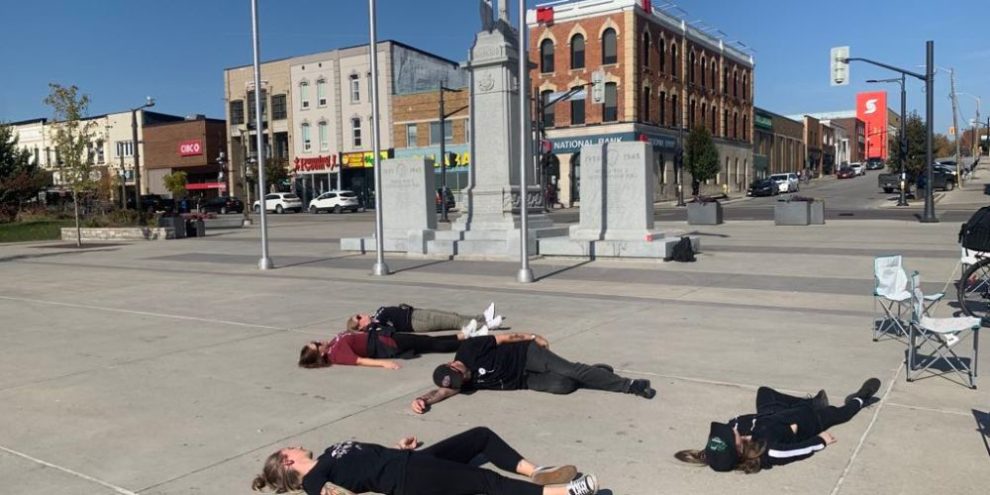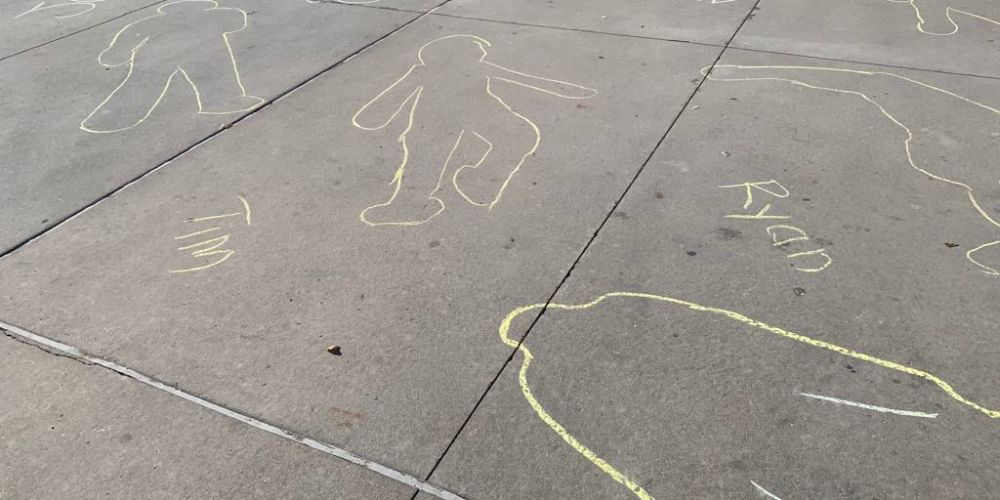
A lunch hour die-in was held at Meridian Place in downtown Barrie on Monday to protest the provincial government's decision to close 10 safe consumption sites across Ontario
About a dozen people, most of them dressed in black, lay on the ground for several minutes while an individual drew a yellow chalk outline of their bodies to symbolize what organizers say will be more overdose deaths as result of closing the SCS's.

Christine Nayler of Ryan's Hope, one of the organizers of the protest, who lost her son Ryan to a toxic overdose, says the closure of these sites will cost lives.
"We already lose eight people a day in our province due to toxic drugs and the government knows that these sites save lives. The decision is going to be deadly and it's going to cost needless lives and grief for families," Nayler said.
In August, Health Minister Sylvia Jones outlined a fundamental shift in the province's approach to the overdose crisis, largely driven by opioids such as fentanyl.
Ontario will shutter the 10 sites by March 2025 because they're too close to schools and daycares, and the government will prohibit any new ones from opening as it moves to an abstinence-based treatment model.
Nayler said there is no scientific or medical advice to back up the premier's decision.
"He's playing politics with people's lives."
Health workers, advocates and users of the sites have warned of a spike in deaths when the sites close.
Opioids began to take a hold in Ontario in 2015 with the rise of illicit fentanyl. Opioid toxicity deaths surged during the COVID-19 pandemic and hit a peak mortality rate of 19.3 deaths per 100,000 people in 2021, data from the Office of the Chief Coroner shows. That year 2,858 people died from opioids, the vast majority of which contained fentanyl.
The mortality rate dropped to 17.5 deaths per 100,000 people, or 2,593 people, last year, but remains more than 50 per cent higher than in 2019.
The Ford government introduced the consumption and treatment services model in 2018. At that time, the province put in place a cap of 21 such sites in the province, but has only funded 17.
Premier Doug Ford has since called it a "failed policy."
The province said it will launch 19 new "homelessness and addiction recovery treatment (HART) hubs" plus 375 highly supportive housing units for $378 million.
Health Minister Sylvia Jones has said no one will die as a result of the closures and Ford has said advocates should be grateful for the new model.
Nayler said treatment hubs don't go near enough to address the issue.
"We know that we need a comprehensive healthcare approach to addressing the toxic health crisis which includes all measures of harm reduction and meeting people where they're at. People aren't always ready to go into treatment and we don't have enough treatment beds for people who want to go into treatment. There is six-month waitlist for people to get a treatment bed in the province of Ontario."
Nayler said the die-ins also happened simultaneously in communities across the province and at Queen's Park.
Earlier this month, Barrie city councillors approved a direct motion to support the County of Simcoe's application to the province for a HART hub to respond to the community's complex service needs, including homelessness, substance use and mental health.
The Barrie protest was also organized by the Barrie Encampment Support Network, a mutual aid community comprised of encampment and unsheltered residents in the city, and Moms Stop the Harm, a network of Canadian families impacted by substance-use-related harm and deaths.
Pictures of local and other victims of toxic overdose were displayed on a banner at the demonstration.
"They were loved by families and friends," said Nayler. "Their lives mattered and their lives are gone due to policy failures."
With files from The Canadian Press





